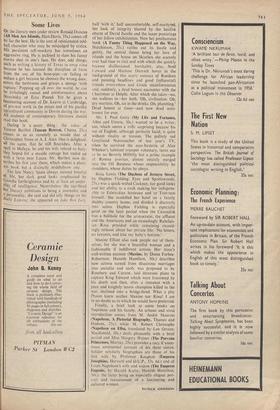Some Lives
OF the literary men under review Ronald Duncan (All Men Are Islands, Hart-Davis, 35s.) comes off by far the best. He is the sort of opinionated odd- ball character who may be misjudged by critics. His persistent self-mockery has sometimes an aggressive ring. He is inclined to slam his funny stories shut in one's face. He does odd things, such as writing a history of Texas in terra pima because he has learned the discipline of form froth the use of his hose-pipe—or failing to seduce a girl because he chooses the wrong door, enters the bathroom and grasps a sponge 'with rapture.' Popping up all over the world, he can be irritatingly casual and uninformative about Stravinsky or Ezra Pound. Yet he gives a fascinating account of Dr. Leavis at Cambridge, of pre-war work in the mines and of his pacifist agricultural community in Devon during the war. All students of contemporary literature should read this book.
Dating is a queer thing : the voice of Vernon Bartlett (Tuscan Retreat, Chatto, 25s.) comes to us as remotely as. would that of Christopher Stone or A. J. Alan. One is delighted, all the same, that he still flourishes. After a Spell in Malaya, he and his wife retired to Italy; they hoped for a seaside cottage but ended up with a farm near Lucca. Mr. Bartlett now de- scribes his first year there, which makes a pleas- ant book but a distinctly middlebrow one.
The late Nancy Spain always seemed brimful of life, her dark good looks emphasised by (kordie forthrightness and by at least an under- play of intelligence. Nevertheless she sacrificed her literary ambitions to being a journalist and a Personality; she said and did silly things on the Diilly Express; she appeared on Joke tins jiffy, half 'with it,' half uncomfortable, self-martyred, her look of integrity blasted by the basilisk charm of David Jacobs and the inane posturings of her fellow exhibitionists. Now her posthumous book (A Funny Thing Happened on the Way, Hutchinson, 21s.) rattles out its bustle and gaiety, the central theme being her love of islands and the house on SkiathOs she scarcely ever had time to visit and with which she quickly became disillusioned. Inevitably, alas, Noel Coward and Marlene Dietrich hover in the background of this scatty mixture of Roedean and punning headlines and good (influential) friends everywhere and Greek misinformation and, suddeplY, a dead honest encounter with the Charioteer at Delphi. After which she takes—no, she wallows in—her bath. `Oh, civilisation. Oh, dry martinis. Oh, ice in the drinks. Oh, plumbing.' Dead honest at times—and now dead semi- honest for ever.
M r. J. Paul Getty (My Life and Fortunes, Allen and Unwin, 30s.) wanted to be a writer, too, which seems a trifle surprising because his use of English, although perfectly lucid, is quite without vitality or tension. The politely sad Greyfaced Nutmuncher of last year's TV, when he survived the near-hysteria of Alan Whisker's habitual trumpet voluntary, turns out to be no Beverly Hillbilly but a prime example of Roman gravitas, almost entirely merged into the Oil Business whose responsibility he shoulders, whose duties he obeys.
Rosa Lewis (The Duchess of Jermyn Street, by Daphne Fielding; Eyre and Spottiswoode, 25s.) was a 'quick-witted Cockney, her good looks and her ability as a cook making her indispens- able to Edwardian hostesses and to Tum-turn himself. She modelled her hotel on a faintly shabby country house; and divided it discreetly into suites. Daphne Fielding is especially good on the later period when the Cavendish was a bolthole for the aristocratic, the affluent and the Americans and an exceedingly Rabelais- ian Rosa presided while remaining exceed- ingly reticent about her private life: 'No letters, no lawyers, and kiss my baby's bottom.'
Maxine Elliott also took people out 'of them- selves, for she was a beautiful woman and a fashionable if indifferent actress. Her niece's well-written account (Maxine, by Diana Forbes- Robertson; Hamish Hamilton, 30s.) describes how actress turned from disastrous marriages into socialite and snob, was proposed to by Rosebery and Curzon, laid decorous plans to capture King Edward which were frustrated by his death and then, after a romance with a pure and knightly tennis champion killed in the war, declined into a bridge-fiend. What a pity Proust knew neither. Maxine nor Rosa! l am in no doubt as to which he would have preferred.
Finally, a brief look at some books on Napoleon and his family. An urbane and vivid introduction conies from M. Andre Maurois (Napoleon, A Pictorial Biography, Thames and Hudson, 25s.) while M. Robert Christophe (Napoleon on Elba, translated by Len Ortzen; Macdonald, 30s.) deals pleasantly with a brief period and Miss Margery Weiner (The Parvenu Princesses, Murray, 25s.) provides a racy if some- times sentimental account of his three sisters. Solider scholarly biographies are those of his first wife by Professor Knapton (Empress Josephine, Harvard and f;:).U.P., 37s. 6d.) and of Louis Napoleon's wife and widow (The Empress Eugenie, by Harold Kurtz; Hamish Hamilton, 50s.), the latter being an especially elegant por- trait and reassessment of a fascinating and cultured woman.
PATRICK ANDERSON






































 Previous page
Previous page